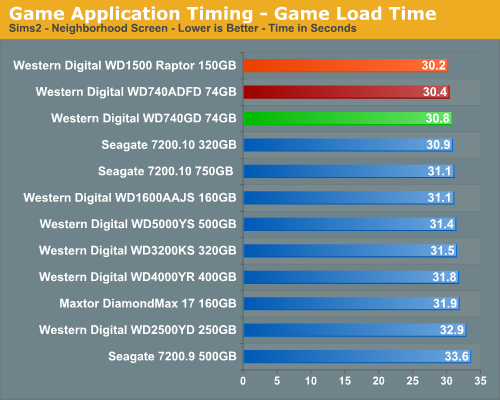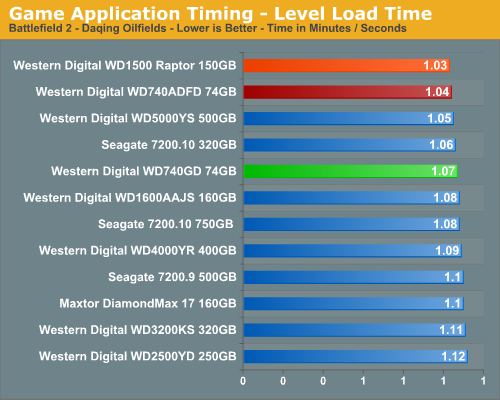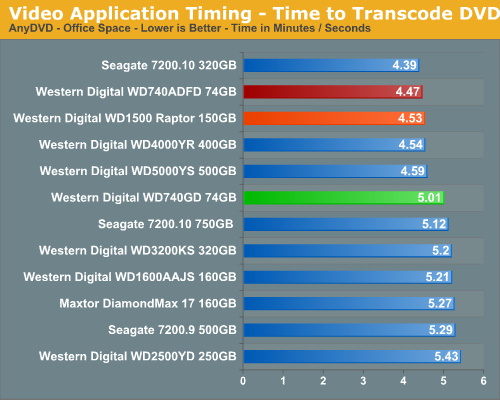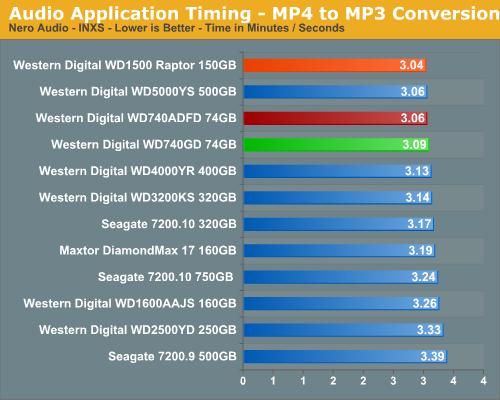Western Digital WD740ADFD: Bottled Lightning
by Gary Key on February 7, 2007 3:30 AM EST- Posted in
- Storage
Actual Application Performance
Our application benchmarks are designed to show application performance results with times being reported in minutes / seconds or seconds only, with lower scores being better. While these tests will show some differences between the drives it is important to understand we are no longer measuring the pure performance of the hard drive but how well our platform performs with each individual drive. The performance of a hard drive is an integral part of the computer platform but other factors such as memory, CPU, core logic, and even driver choice can play a major role in determining how well the hard drive performs in any given task. Also worth noting is that new features of Windows Vista - specifically SuperFetch - can further reduce the measured performance differences between hard drives.
Game Load Test
Our Sims 2 - Open for Business test measures the time it takes to load the initial portion of the game. Our application timer starts when the game icon is initiated until the neighborhood menu appears.

The results are basically the same as our iPeak results as the WD Raptor series continues to lead all drives, but the performance differences are not as drastic once we take into account the entire platform. The times might not show that great of a difference but over the course of game play we could always identify the system with a Raptor in it. Of course, our ears generally knew first but we could tell the differences in game startups and level loads with a Raptor equipped drive.
Game Level Load
This test centers on the actual loading of a playable level within our game selections. We run Battlefield 2 and measure the time it takes to load the Daqing Oilfields level. Our application timer begins when the start single player icon is initiated and ends when the join game icon is visible.

The WD1500ADFD Raptor continues its pattern of being the best available drive for the gaming enthusiast and our subjective opinion also matches the test scores. Of course, the difference in load times between the Raptor and the WD2500YD drive was only nine seconds but it seemed like an eternity as we repeated the tests for each drive. The WD740ADFD finishes right behind the WD1500ADFD once again proving that the improved firmware, increased cache size, and single platter design allows it to keep up with the 150GB drive.
AnyDVD 5.9.6
Our next test has us utilizing the "ripping" function of AnyDVD to copy the Office Space DVD file from our source drive to our test drive. Our DVD features 29 files totaling 7.55GB of data and is an excellent test for determining the write speed of a drive.

Our Seagate Barracuda 7200.10 320GB drive scores extremely well in this test. The WD740ADFD also finishes ahead of the WD1500ADFD in this test where write speeds are extremely critical for the performance of the drive.
Nero Audio Encode
Our last test has us utilizing the audio encoding functions of Nero to convert our INXS Greatest Hits audio files in MP4 format to a high quality variable rate MP3 file for our portable player. Our test features 16 files totaling 137MB of data and is an excellent test for determining the read and write speed of a drive.

The test results show once again the amount of time a fast hard drive like the WD Raptor can save over the course of audio or video file manipulation session. In this case, the WD1500ADFD finishes just ahead of the 74MB Raptors where it handles small block sizes in sequential order slightly better.
Our application benchmarks are designed to show application performance results with times being reported in minutes / seconds or seconds only, with lower scores being better. While these tests will show some differences between the drives it is important to understand we are no longer measuring the pure performance of the hard drive but how well our platform performs with each individual drive. The performance of a hard drive is an integral part of the computer platform but other factors such as memory, CPU, core logic, and even driver choice can play a major role in determining how well the hard drive performs in any given task. Also worth noting is that new features of Windows Vista - specifically SuperFetch - can further reduce the measured performance differences between hard drives.
Game Load Test
Our Sims 2 - Open for Business test measures the time it takes to load the initial portion of the game. Our application timer starts when the game icon is initiated until the neighborhood menu appears.

The results are basically the same as our iPeak results as the WD Raptor series continues to lead all drives, but the performance differences are not as drastic once we take into account the entire platform. The times might not show that great of a difference but over the course of game play we could always identify the system with a Raptor in it. Of course, our ears generally knew first but we could tell the differences in game startups and level loads with a Raptor equipped drive.
Game Level Load
This test centers on the actual loading of a playable level within our game selections. We run Battlefield 2 and measure the time it takes to load the Daqing Oilfields level. Our application timer begins when the start single player icon is initiated and ends when the join game icon is visible.

The WD1500ADFD Raptor continues its pattern of being the best available drive for the gaming enthusiast and our subjective opinion also matches the test scores. Of course, the difference in load times between the Raptor and the WD2500YD drive was only nine seconds but it seemed like an eternity as we repeated the tests for each drive. The WD740ADFD finishes right behind the WD1500ADFD once again proving that the improved firmware, increased cache size, and single platter design allows it to keep up with the 150GB drive.
AnyDVD 5.9.6
Our next test has us utilizing the "ripping" function of AnyDVD to copy the Office Space DVD file from our source drive to our test drive. Our DVD features 29 files totaling 7.55GB of data and is an excellent test for determining the write speed of a drive.

Our Seagate Barracuda 7200.10 320GB drive scores extremely well in this test. The WD740ADFD also finishes ahead of the WD1500ADFD in this test where write speeds are extremely critical for the performance of the drive.
Nero Audio Encode
Our last test has us utilizing the audio encoding functions of Nero to convert our INXS Greatest Hits audio files in MP4 format to a high quality variable rate MP3 file for our portable player. Our test features 16 files totaling 137MB of data and is an excellent test for determining the read and write speed of a drive.

The test results show once again the amount of time a fast hard drive like the WD Raptor can save over the course of audio or video file manipulation session. In this case, the WD1500ADFD finishes just ahead of the 74MB Raptors where it handles small block sizes in sequential order slightly better.










26 Comments
View All Comments
Genx87 - Wednesday, February 7, 2007 - link
Once you have one you cant go back :DThey are wonderful drives. The capacity issue isnt a big deal unless you are opting for the 36GB version. I havent had a need for excessive amounts of capacity since I built my sever a couple of years ago.
I built a server with a pair of the 36GBs with a 500GB array behind it for storage. It is a very nice step up from the pair of 80GB 7200 rpm drives in there before.
aka1nas - Wednesday, February 7, 2007 - link
They definately make great OS/Applications drives if you back them up with a bigger drive for bulk storage.Genx87 - Wednesday, February 7, 2007 - link
oops forgot to mention my machine at home has the newest 74GB raptor in it. Which is an upgrade from the 1st run 74GB raptor in my old machine.Blazing fast, as usual.
Muzzy - Wednesday, February 7, 2007 - link
"Of course, if you are into benchmarking or run a lot of disk intensive applications, then a pair of Raptors in RAID 0 will be even better."Um, aren't you guys contradicting yourself here? In July 1st, 2004 article about Raptor drives in RAID-0, you stated "If you haven't gotten the hint by now, we'll spell it out for you: there is no place, and no need for a RAID-0 array on a desktop computer." I love my 150GB Raptor despite the noise, don't get me wrong. Really do wish though that other company would give WD some competition in this category. $190 for 150GB??
JarredWalton - Wednesday, February 7, 2007 - link
Most people don't really care about running benchmarks for bragging rights, and most desktop users do not "run a lot of disk intensive applications". We don't think RAID 0 is even remotely necessary for 99% of people, but there are still benchmarks where it is obviously faster. If you have BitTorrent running in the background with other networked computers streaming data off of the same drive and you start to run games that load off of the same drive, yes, RAID 0 will clearly outperform a single drive. That's more of a server/workstation workload, which is why we say that RAID 0 on a desktop computer isn't needed.Axbattler - Thursday, February 8, 2007 - link
*Ponders*Where RAID-0 excels is in STR performance. Loading of applications that benefit from STR (e.g. XP), copying a large massive file, working with a large massive file (video editing) etc. are applications where you will see a significant gain with RAID-0.
RAID-0 may well be faster than a single drive identical drive in most applications (you do pay slightly in access time, but the gain from STR can probably offset it more often than not).. But how about a well two individual drives in a reasonably configured system? I am not convinced that in the scenario that you've described (which, I do not believe reflects the nature of the workload in a server in the first place), that you are necessarily better off with RAID-0 than two individual drives. I would rather have one drive running the game, and the other doing the streaming/torrenting. Game loading time is not exactly where I've seen RAID-0 shine the most (and once the game is running, you'll pretty much get no gain from RAID-0).
JarredWalton - Thursday, February 8, 2007 - link
Then carry it a bit further. Basically, I'm saying that if you generate enough concurrent HDD accesses, RAID 0 will outperform single drives. You might get better performance from two drives without RAID 0, but then you need to worry about having separate volumes and what happens if most of the accesses start to target a single drive. Basically, RAID 0 can be faster than an individual drive, but this mostly occurs in unrealistic situations, as you point out. RAID 0 mostly seems to be for bragging rights, and I certainly don't recommend it.lemonadesoda - Wednesday, February 7, 2007 - link
Most Raptorers (the people who love and install them) typically choose a dual drive RAID setup for ultimate HDD performance.However, seeing the (very close) performance of Seagate 7200.10, I would be very interested to see Raptors in RAID vs 7200.10 in RAID.
Would the performance gap INCREASE or DECREASE in such a configuration?
Le Québécois - Wednesday, February 7, 2007 - link
It's nice to see my WD1500ADFD is still the top gaming drive on the market. Still something has been bothering me for some time now.I've always found intriguing that my Raptor temperature is about 40% lower (idle and under load) than the one you post on every HDD articles. I have a 80mm Antec front fan but still the temperature is 40% lower, not 25%.
What's the room temperature? You always post the base dB of the room but I don't remember ever seeing the temperature.
jabber - Wednesday, February 7, 2007 - link
Indeed, I bought one of these 74Gb Raptors a few weeks ago and it never gets more than slightly warm. Certainly doesnt warrant an 80mm fan blasting on it.I do recommend the WD Secure SATA cable though. Great bit of kit. How the standard SATA cable connection setup got approved I'll never know.
The niggle I have is that 74Gb is too small? I have a full XP install, several apps and games (BF2/Total War etc. etc. and its still got plenty of space. Why would you bother cluttering up your main system HD with non-essential stuff like media files? Just get a cheap 400Gb+ for that sort of thing where performance isnt an issue.